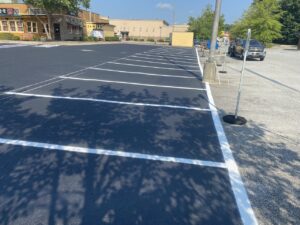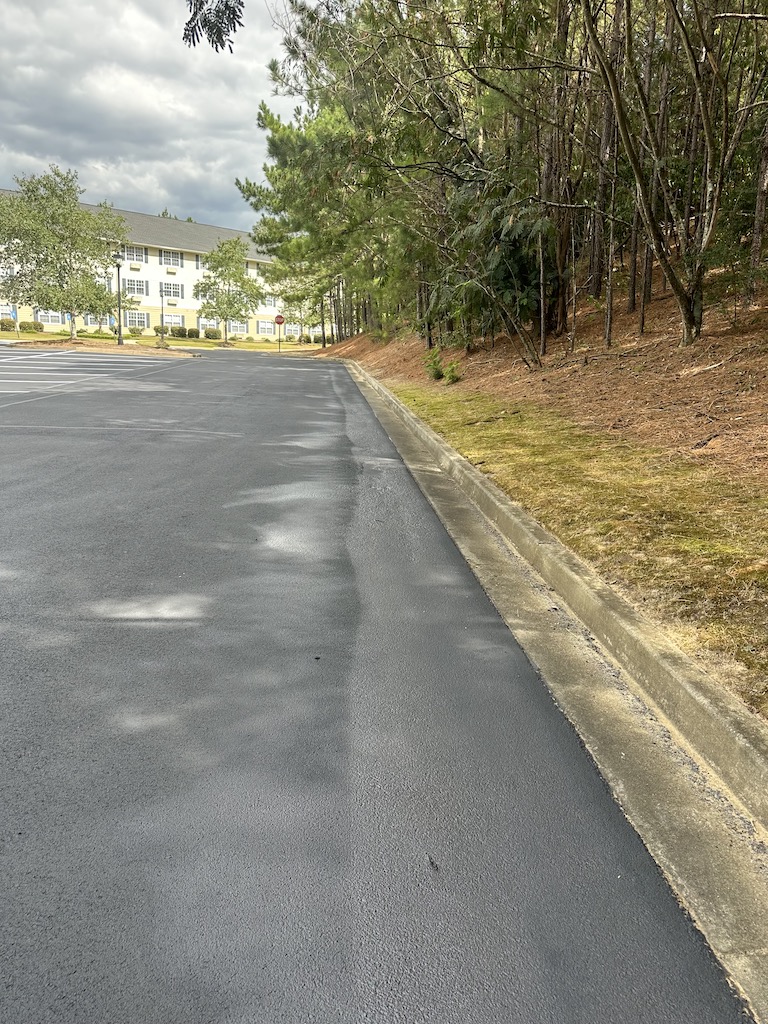
Why Is Sealcoating a Parking Lot Important?
Asphalt sealcoating has a variety of both cosmetic and protective properties. As a cosmetic treatment, it restores the rich, dark color that your pavement had when it was new. It also conceals minor imperfections to make the surface of your pavement appear more even. As a protective treatment, sealcoating Atlanta pavements helps prevent damage from the sun’s UV rays. Exposure to UV rays will turn your pavement dry and brittle, increasing the likelihood of cracking. The UV rays will also fade your pavement’s color. Sealcoating will also help prevent automotive fluids from creating soft, crumbly spots in your pavement. Furthermore, sealcoating can boost asphalt’s natural waterproofing properties to help prevent water penetration.
How Frequently Do Asphalt Contractors Recommend Sealing?
Although the time between applications can vary, sealcoating contractors typically suggest resealing a parking lot every two years. However, there are several factors that can influence this. For example, a very busy parking lot that supports heavyweight trucks may need sealcoating more frequently. Conversely, a parking lot for a few passenger vehicles may only need sealing every three or four years. Therefore, you will need to consult a reputable sealcoating contractor to recommend the appropriate interval for your specific parking lot.
What Types of Repairs Are Necessary to Prepare for Sealcoating?
If your pavement is less than three years old, you should not need very many repairs. This will probably be true if you have kept up with the parking lot maintenance on an older pavement. However, new or old, you want to make sure that your parking lot maintenance contractor performs the following repairs.
1. Repair all cracks that exceed approximately a quarter of an inch in depth or width. Otherwise, the liquid sealcoating will drain into the void without closing the crack to the elements.
2. Repair any potholes. Depending on the size and depth of the pothole, this may require an asphalt patch.
3. Repair any depressions in the pavement in which water collects. Normally, this is a very simple repair that can help resolve a variety of issues related to these seemingly trivial problems.
4. Repair areas with alligator cracking. Crack sealing and crack filling are not effective methods for repairing alligator cracking. In most cases, alligator cracking signals damage to the foundation, so a full-depth patch is normally the best repair method.
5. Remove puddles of oil, fuel, and other automotive fluids. These fluids can soften asphalt pavements, so your sealcoating contractor needs to test the integrity of the pavement beneath them. If it is sufficient, your contractor should clean the stains thoroughly, and it may be necessary to prime them. If the pavement beneath is soft, your contractor will need to make a repair.
When you need sealcoating in Atlanta, call MH Greeson Paving. We also offer asphalt crack repair, bollards, asphalt paving, traffic signs, parking lot striping, car stops, ADA compliance, and pavement markings. Whether you need a complete parking lot maintenance plan, a one-time service, or anything in between, we can help. We have an impeccable reputation for extraordinary customer service and exceptional craftsmanship. For a free job quote, fill in our online form, call 770-335-2983, or email Tripp@MHGreesonPaving.com.




